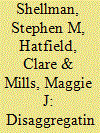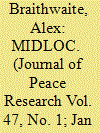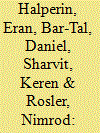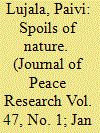|
|
|
Sort Order |
|
|
|
Items / Page
|
|
|
|
|
|
|
| Srl | Item |
| 1 |
ID:
093604


|
|
|
|
|
| Publication |
2010.
|
| Summary/Abstract |
While some of the intrastate war literature calls for the disaggregation of civil conflict, most of those studies focus on the geography of civil conflict failing to take into account the various actors involved in such conflicts. This study addresses the multi-actor nature of civil conflict by examining whether 'actor aggregation' affects the inferences drawn from quantitative studies of civil conflict. Using two cases, Cambodia (1980-2004) and Indonesia (1980-2004), the authors examine how multiple dissident groups' behavior aggregated together can affect the inferences drawn from quantitative studies of government-dissident interactions. The results demonstrate that researchers may draw different inferences and commit both Type I and Type II errors using different actor aggregations. The results have myriad implications for the study of civil conflict and conflict processes.
|
|
|
|
|
|
|
|
|
|
|
|
|
|
|
|
| 2 |
ID:
093598


|
|
|
|
|
| Publication |
2010.
|
| Summary/Abstract |
This article aims to demonstrate that differences in the two major datasets can significantly affect the results of predictions of mass political killing. Mass political killing (such as Hitler's killing of some six million Jews, or the Rwanda genocide of 1994) has been studied for decades with the aid of valuable datasets measuring 'democide' and 'genocide and politicide', respectively. Without attempting to take sides as to whether one or the other is a more valid measure of the phenomenon of mass political killing, the authors aim in this investigation to see what independent variables best account for the onset of mass political killing, with the state-year as the unit of analysis. The predictor variables are level of economic development; types of war and violent unrest short of war; and regime type. By using a Cox proportional hazard model, the authors find that important regime effects either appear or disappear depending on the dataset used, with regime generally having a significant effect on onset of democide, but not having a significant effect on onset of geno-politicide. It is important for the scholarly community to be aware of these dataset effects, which may be the source of some of the most important existing controversies in the literature on explaining mass political killing.
|
|
|
|
|
|
|
|
|
|
|
|
|
|
|
|
| 3 |
ID:
093603


|
|
|
|
|
| Publication |
2010.
|
| Summary/Abstract |
The role of the media in foreign policymaking has been the subject of significant academic enquiry, particularly in response to the so-called 'CNN effect', but this work has mostly focused on prominent Western nations (particularly the United States). This article enlarges the debate by adding a comparative and post-communist perspective. Taking the Kosovo conflict as a case study, it analyses the role of the media in foreign policy in Bulgaria and Britain. Through the application of Robinson's policy- media interaction model, the article argues that the Bulgarian press did not have any substantial impact on the government's position on the Kosovo conflict because it framed its reports in a neutral way. The British press/foreign policy relationship discloses a clear case of media support for governmental policy. The findings raise questions about the validity of certain claims about the media-policy relationship in former socialist countries. The article identifies limitations to models based on Western media systems and suggests that their construction is often based on certain cultural assumptions and hence very much context bound
|
|
|
|
|
|
|
|
|
|
|
|
|
|
|
|
| 4 |
ID:
093605


|
|
|
| 5 |
ID:
093602


|
|
|
|
|
| Publication |
2010.
|
| Summary/Abstract |
Although prolonged occupation of a nation is no longer a common phenomenon, where it does exist, it bears harsh implications for all parties involved. This article examines the socio-psychological implications of occupation on the occupying society, using the case of the Israeli occupation of the Palestinian territories of the West Bank and Gaza Strip since 1967 as an example. The article first delineates the concept of occupation from a socio-psychological perspective, which supplements the legal-formal aspect. The authors then propose a conceptual framework that analyzes the psychology of the occupying society. Within this framework, they describe the psychological challenges that the occupation may pose to the members of the occupying society. Next, they introduce psychological mechanisms that members of an occupying society may use in order to avoid facing these challenges. Finally, they offer a number of ideas regarding the relationship between these mechanisms and the process of ending the occupation.
|
|
|
|
|
|
|
|
|
|
|
|
|
|
|
|
| 6 |
ID:
093599


|
|
|
|
|
| Publication |
2010.
|
| Summary/Abstract |
Why is armed civil conflict more common in resource-dependent countries than in others? Several studies have attempted to unravel mechanisms on why natural resources are linked to armed conflict, but no coherent picture has yet emerged. This article seeks to address this puzzle by concentrating on the issue of how rebel access to natural resources affects conflict. It uses data on gemstone and hydrocarbon localities throughout the world and controls for the spatial and temporal overlap of resources and conflict. The results show that the location of resources is crucial to their impact on conflict duration. If resources are located inside the actual conflict zone, the duration of conflict is doubled. Interestingly, oil and gas reserves have this effect on duration regardless of whether there has been production or not. In addition, a country-level analysis suggests that oil production increases the risk of conflict onset when located onshore; offshore production has no effect on onset. These results support the assertion that natural resources play a central role in armed civil conflicts because of the incentives and opportunities they present for rebel groups.
|
|
|
|
|
|
|
|
|
|
|
|
|
|
|
|
| 7 |
ID:
093601


|
|
|
|
|
| Publication |
2010.
|
| Summary/Abstract |
Classical-liberal arguments about the pacifying effects of international trade are revisited, and it is argued that they consistently refer to the ability of trade to provide 'connections' between people and to create a perceived 'global community'. Dependency and openness are commonly used to test for any pacifying effects of trade in the current literature, but these measures fail to capture some of the classical liberals' key insights. Several network measures are introduced in order to give natural expression to and to develop the classical-liberal view that trade linkages reduce interstate conflict. These measures applied to trade flows are incorporated in the Russett & Oneal triangulating-peace model. The main results are that trade networks are indeed pacifying in that both direct and indirect trade linkages matter, and as the global trade network has become more dense over time, the importance of indirect links by way of specific third countries has declined, and the general embeddedness of state dyads in the trade network has become more relevant. These findings suggest that the period since World War II has seen progressive realization of the classical-liberal ideal of a security community of trading states.
|
|
|
|
|
|
|
|
|
|
|
|
|
|
|
|
|
|
|
|
|